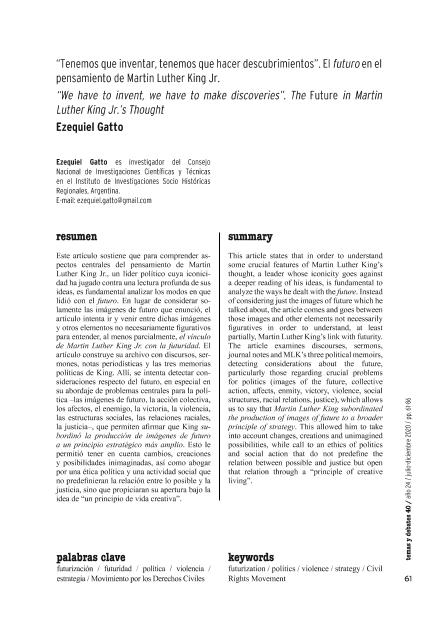Mostrar el registro sencillo del ítem
dc.contributor.author
Gatto, Ezequiel Guillermo

dc.date.available
2021-09-28T20:13:06Z
dc.date.issued
2020-12-23
dc.identifier.citation
Gatto, Ezequiel Guillermo; “Tenemos que inventar, tenemos que hacer descubrimientos”: El futuro en el pensamiento de Martin Luther King Jr.; Universidad Nacional de Rosario. Facultad de Ciencia Política y Relaciones Internacionales; Temas y Debates; 40; 23-12-2020; 61-86
dc.identifier.issn
1666-0714
dc.identifier.uri
http://hdl.handle.net/11336/141767
dc.description.abstract
Este artículo sostiene que para comprender aspectos centrales del pensamiento de Martin Luther King Jr., un líder político cuya iconicidad ha jugado contra una lectura profunda de sus ideas, es fundamental analizar los modos en que lidió con el futuro. En lugar de considerar solamente las imágenes de futuro que enunció, el artículo intenta ir y venir entre dichas imágenes y otros elementos no necesariamente figurativos para entender, al menos parcialmente, el vínculo de Martin Luther King Jr. con la futuridad. El artículo construye su archivo con discursos, sermones, notas periodísticas y las tres memorias políticas de King. Allí, se intenta detectar consideraciones respecto del futuro, en especial en su abordaje de problemas centrales para la política "las imágenes de futuro, la acción colectiva, los afectos, el enemigo, la victoria, la violencia, las estructuras sociales, las relaciones raciales, la justicia", que permiten afirmar que King subordinó la producción de imágenes de futuro a un principio estratégico más amplio. Esto le permitió tener en cuenta cambios, creaciones y posibilidades inimaginadas, así como abogar por una ética política y una actividad social que no predefinieran la relación entre lo posible y la justicia, sino que propiciaran su apertura bajo la idea de "un principio de vida creativa".
dc.description.abstract
This article states that in order to understand some crucial features of Martin Luther King’s thought, a leader whose iconicity goes against a deeper reading of his ideas, is fundamental to analyze the ways he dealt with the future. Instead of considering just the images of future which he talked about, the article comes and goes between those images and other elements not necessarily figuratives in order to understand, at least partially, Martin Luther King’s link with futurity. The article examines discourses, sermons, journal notes and MLK’s three political memoirs, detecting considerations about the future, particularly those regarding crucial problems for politics (images of the future, collective action, affects, enmity, victory, violence, social structures, racial relations, justice), which allows us to say that Martin Luther King subordinated the production of images of future to a broader principle of strategy. This allowed him to take into account changes, creations and unimagined possibilities, while call to an ethics of politics and social action that do not predefine the relation between possible and justice but open that relation through a “principle of creative living”.
dc.format
application/pdf
dc.language.iso
spa
dc.publisher
Universidad Nacional de Rosario. Facultad de Ciencia Política y Relaciones Internacionales

dc.rights
info:eu-repo/semantics/openAccess
dc.rights.uri
https://creativecommons.org/licenses/by-nc-sa/2.5/ar/
dc.subject
FUTURIZACIÓN
dc.subject
POLÍTICA
dc.subject
VIOLENCIA
dc.subject
MOVIMIENTO POR LOS DERECHOS CIVILES
dc.subject.classification
Otras Historia y Arqueología

dc.subject.classification
Historia y Arqueología

dc.subject.classification
HUMANIDADES

dc.title
“Tenemos que inventar, tenemos que hacer descubrimientos”: El futuro en el pensamiento de Martin Luther King Jr.
dc.title
“We have to invent, we have to make discoveries”: The Future in Martin Luther King Jr.’s Thought
dc.type
info:eu-repo/semantics/article
dc.type
info:ar-repo/semantics/artículo
dc.type
info:eu-repo/semantics/publishedVersion
dc.date.updated
2021-09-06T20:59:31Z
dc.identifier.eissn
1853-984X
dc.journal.number
40
dc.journal.pagination
61-86
dc.journal.pais
Argentina

dc.journal.ciudad
Rosario
dc.description.fil
Fil: Gatto, Ezequiel Guillermo. Consejo Nacional de Investigaciones Científicas y Técnicas. Centro Científico Tecnológico Conicet - Rosario. Investigaciones Socio-históricas Regionales - Universidad Nacional de Rosario. Investigaciones Socio-históricas Regionales; Argentina
dc.journal.title
Temas y Debates
dc.relation.alternativeid
info:eu-repo/semantics/altIdentifier/url/https://temasydebates.unr.edu.ar/index.php/tyd/article/view/472
dc.relation.alternativeid
info:eu-repo/semantics/altIdentifier/doi/http://dx.doi.org/10.35305/tyd.v0i40.472
Archivos asociados
